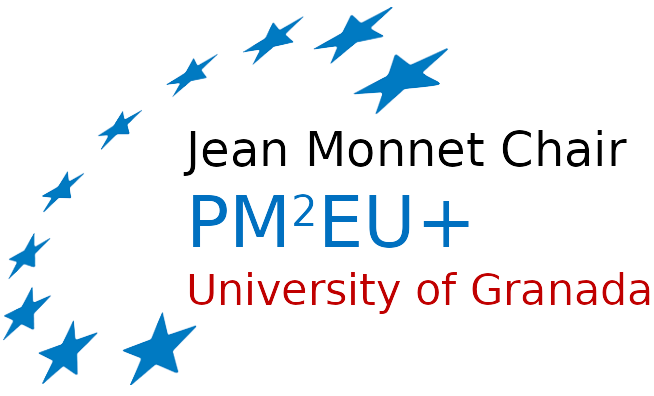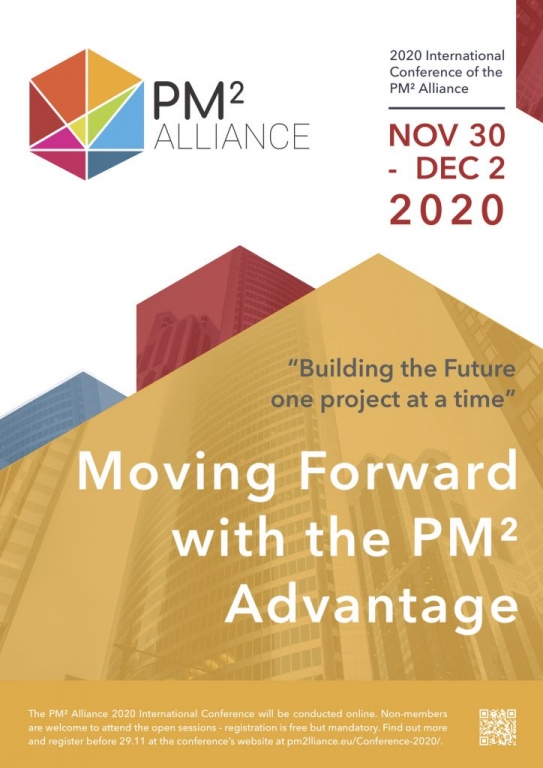The initial proposal of the Chair included a yearly PM2 Talks with the next structure:
- Three lectures by well-known professionals or academics in the field of project management.
- A round table to encourage debate and discussion on the strengths and opportunities to improve the methodology.
- A practical exercise for attendees that allows them to put into practice the concepts learned during the activity.
The PM2 Talks have been designed to be a meeting and discussion point among the different target groups. This will allow the exchange of experiences and different points of view that will benefit all participants.
The conditions derived from the COVID_19 pandemic have made the people in charge of the Chair investigate new forms, models and structures that allow involving the largest possible number of people in the debate and improvement of the PM2 methodology.
Apart from the evolution of the COVID_19 pandemic and the possibility of holding workshops in the future like the proposal includes, we think that the ideal is to stablish collaborations between the Chair and other institutions and companies to develop and participate in debates related to the practical use of the PM2 methodology.
PM2 Talk - Local Administration in the Canary Islands promotes the use of PM²
One of the Chair's frequent collaborators, Agustín Moya Coronado (PM2 Alliance), conducted an interview on 28 March 20223 with the Insular Director of Modernisation, Mr. Daniel González Morales, of the Cabildo Insular de Tenerife (Tenerife Island Council). Because of the interest of the topic discussed (implementation of the methodology in a public administration), it is shared literally.
Headline: Local Administration in the Canary Islands promotes the use of PM²
At PM²Alliance we have wanted to talk with Mr. Daniel González Morales, Director of Modernization of the Cabildo de Tenerife, to learn directly from him about the adoption of the PM² Methodology in the work developed by the Cabildo.
Q.- How did the Cabildo de Tenerife become interested in the PM² Methodology?
A.- The interest arises as the result of the preparation of the Modernization Plan of the Cabildo de Tenerife 2020-2023, as a major element for the improvement of the Cabildo as a public administration at the island level, promoting a more effective, efficient, agile and close model of Administration. The Plan includes five strategic objectives: improving the quality of public services, reducing processing times, reducing administrative burdens, making the activity of the Cabildo more transparent, and encouraging citizen participation and collaboration. These strategic objectives are articulated in a series of lines of action that are defined in 47 specific projects. One of these projects specifically envisages the adoption of a project management methodology in all of the Cabildo's projects.
Q – The plan then contemplates the implementation of a project management methodology, without defining which. Why did you choose the PM² Methodology?
A.- PM² offers an approach of enormous closeness and affinity with the public administration. It is simple to understand and apply, and with the support of the European Commission, it seemed to us a safe bet. We also needed a methodology that was flexible and with possibilities of progressive implementation, since in the administration we have people with very diverse training, capacity and skills and it is necessary to advance very gradually when introducing methodological changes. PM² answers all these questions.
Q.- When was the Modernization Plan and the project for the adoption of the PM² Methodology launched?
A.- Well, the truth is that, like so many other things, the whole process was greatly affected by the appearance of the pandemic and the consequent isolation measures. The Plan was going to be approved just at that time and suffered not only a delay, but also had to restructure some of the projects already included in the plan: 1. Teleworking. 2. Participatory management by objectives. 3. Project management. The implementation of Teleworking was prioritized and supported by Project Management with the implementation of the PM² Methodology, which was also started earlier. From Human Resources of the Cabildo the synergy between these two projects with the Participatory management by objectives was immediately perceived, since managing by projects facilitates the definition of objectives, results and specific tasks that can be integrated and analyzed within the framework of compliance with teleworking, benefiting both employees and the organizational model itself.
Q.- How is working by projects turning out in the Cabildo?
A.- We must bear in mind that the Plan aims to promote a very strong organizational change. Project management implies a change in organizational culture, breaking traditional work units based on watertight silos and moving to a matrix model in which transversal services work together and resources are better used. It is a slow change that requires a greater coordination effort, but that generates more effective and efficient services for citizens and the PM² Methodology is a good point of support in this change of model.
Q.- What have been the main steps taken for the adoption of the PM² Methodology?
A.- The project has relied very strongly on the creation of a Project Management Office as a support element for the rest of the projects. This has been very important, since it has allowed to have internal resources dedicated to solving the questions that have arisen and internally reinforcing the capacities of the different teams. The first thing has been to define the tailoring of the PM² Methodology that we needed, creating our own PM² Project Management Methodology Guide that is, in itself, a deliverable of the project.
Q.- What modifications have been necessary to adapt the PM² Methodology?
A.- The PM² Methodology is, by definition, very flexible and we have introduced changes to adapt it to our needs. For example, we have defined the roles and responsibilities of the organizational model according to our own work scheme based on a Project Chief, a Project Development Team, User Representatives, and the Project Management Office. We use the same PM² phases and processes and have kept some templates, but we have modified others to ensure the alignment of projects with strategic objectives and the definition of indicators to facilitate monitoring and control. We have taken an approach to start with the minimum and simplest model, with the idea of growing and evolving g as the implementation progresses.
Q.- How is the project to adopt the PM² Methodology integrated with the rest of the Cabildo's directorates?
A.- The Insular Directorate of Modernization has among its competences the technical coordination of the working groups and the necessary measures for the promotion of transversality and improvement of the internal functioning of the Corporation. This implies extending the project work model, and the adoption of the PM² Methodology throughout the Cabildo. We have the support of the Regional Counselor of the Presidency, Finance and Modernization Area, Mrs. Berta Pérez Hernández, to promote these changes in a transversal way. But we are very aware that these are changes that need to be made slowly since it is a continuous work and that needs everyone to accept and assimilate them. In the long term it is a necessary and beneficial investment for the results it yields in terms of effectiveness and efficiency.
Q.- What are the biggest difficulties or challenges you have faced in the adoption process?
A.- As I said, change management is perhaps the biggest challenge we have faced, since we are talking about a very profound change, both in organizational model and culture and in work processes. It has been essential to have internal staff, from within the house, in charge of the Project Management Office, to attend to the difficulties that came up and to take the pulse of the pace of implementation. Surely other directorates and public administrations can benefit from our experience, which we can take as a successful pilot, and learn from our example and learnings in the process.
Q.- Have you needed to implement any capacity building process for the adoption process?
A.- We have opted, above all, for internal training taking advantage of the strength of our own team and the free and open materials provided by the European Commission in its PM² portal, which are also in Spanish. But we have also received specific training from EvergreenPM, an Affiliated Training Provider of PM²Alliance, since we support individual certification as another way to promote the methodology. In addition, we have included the number of people certified by PM²Alliance as an indicator of performance and quality.
Q.- What are the next steps for the PM² Methodology at the Cabildo?
A.- We would like to continue deepening our adoption and implementation of the Methodology, looking towards the management of programs and portfolios to integrate all management under the same methodology, in line with the island strategy and the 2030 Agenda. For the time being, we plan to continue strengthening the use of the methodology, continue its progressive implementation and evaluate the project, as we have been doing annually in a transparent manner, to take stock of the experience.
Q.- What would that balance be like, in general terms?
A.- The balance is undoubtedly positive. Moving to project work is a challenge, but the PM² Methodology is helping in the process of transition and change of culture and organizational model. The implementation of the PM² Methodology is allowing us to be more effective and efficient in our projects. We have more clarity and ability to align projects to the strategic lines we have marked and it is easier for us to set objectives, assign indicators, plan and track tasks and results. The implementation of the PM² Methodology in the Insular Directorate of Modernization can be considered a success that we hope to be able to replicate in other areas of the Cabildo de Tenerife.
Thank you very much for your time and attention. From PM²Alliance we wish you the greatest success in all your projects and we are at your disposal for any question related to PM².
Agustín Moya Colorado
PM² Alliance Regional Coordinator Spain
P.S.: For its interest, we share the adaptation / simplification of the methodology carried out by the Cabildo Insular, which can be downloaded in this link:
PM2 Talk - Is PM2 training interesting for Ireland's engineering students?
On Tuesday 14 February 2023, Jean Monnet Professor Germán Martínez held a working meeting with Dr. Deasún Ó Conchúir (a well-known project manager who has dedicated more than thirty years of his professional career to training and advanced consultancy in project management. He is also an expert in different project management methodologies such as PRINCE2® and the Project Management Institute's work framework).
The idea was to share the possibilities of the European Commission's PM2 methodology for the training of technical university students in Ireland.
Some of the aspects that were reviewed were:
- Flexibility in its application.
- Its open and free access nature.
- Its origin within the European Commission (we both defended our belief in the importance of Europe).
- The need of a previous training in project management in order to get the most out of the methodology.
- The possibilities of improving some aspects of the methodology, especially those related to the governance model, the excessive number of artefacts and continuous references to the IT environment, which reduces its universality.
- The lack of a well-developed and structured community of users in order to share experiences and improve the methodology.
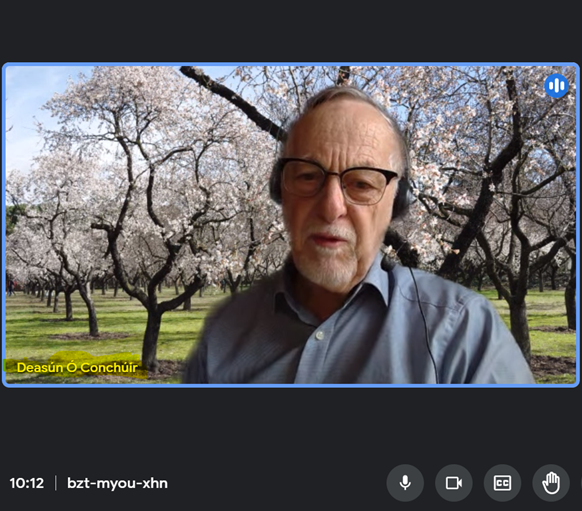
Without a doubt, it has been an interesting day in which sharing reflections and concerns allows for a deeper understanding of the PM2 methodology as well as those aspects that have room for improvement.
PM2 Talk - PM2 Follow-up Meeting
On Tuesday 27 September, a workshop was held among project management professionals from consulting companies, training companies and academia. All of them have participated in the Spanish translations of the PM2 Guide and the PM2 Agile Guide. The participants were:
- Juan Manuel Dominguez (APGP)
- Javier Pajares (Professor in Project Management at the University of Valladolid)
- Agustín Moya (PM2 Alliance Member)
- Ángel Agueda (EvergreenPM - CEO)
- Begoña Moreno (University of Granada – Chair Holder)
- Germán Martínez (University of Granada – Chair Academic Coordinator)
The attached document, which can be downloaded in pdf format, summarises the main aspects that were discussed and the recommendations made by this working group in order to continue with the continuous improvement of the PM2 methodology framework.
Findings and recommendations reached were mainly related to practical aspects of the use and implementation of the methodology, as follows:
- Translations into Spanish.
- Professional certifications in PM2.
- Guides and artefacts available.
- Experiences - Cases of application.
- Digitisation.
- Review, update and continuous improvement.
White Paper - PM2 Follow up Meeting - What is going on?
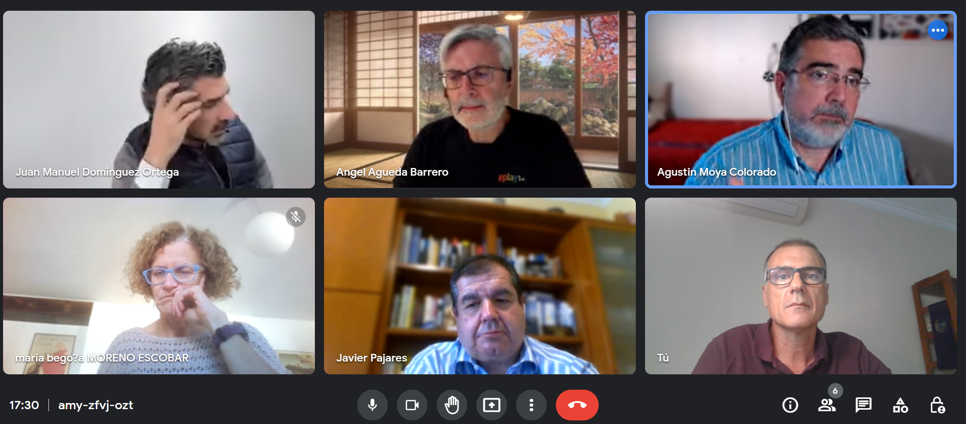
Open to the board Public - Project Management AEDIP Talks
On June 16, the Jean Monnet Chair participated in a Webinar organized by the Spanish Association of Integrated Project Management. In particular, the framework of the European Union Resilience Fund and the role that PM2 methodology can play in the success of its management was discussed.
"AEDIP is an employers' association constituted under the Spanish Law 19/1977 on the regulation of the right to trade union association, of April 1st. It is a national, non-profit entity, for an indefinite period of time, which adopts the name of "ASOCIACIÓN ESPAÑOLA DE DIRECCIÓN INTEGRADA DE PROYECTOS" (SPANISH ASSOCIATION OF INTEGRATED PROJECT MANAGEMENT).
It is formed by consulting and engineering companies in the construction sector, which consider the "Construction Project Management" as the "most appropriate way to carry out projects in this sector, from its conception to its final delivery to the client, ready for use".
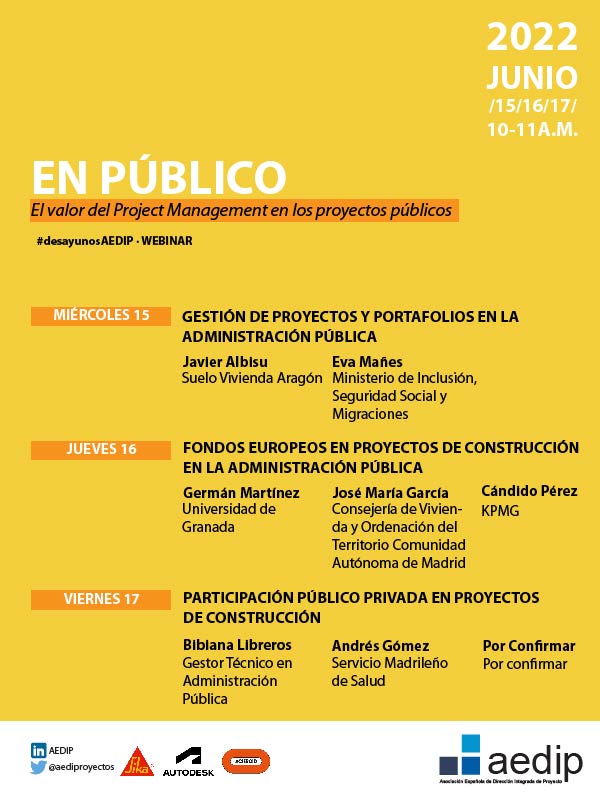
Meeting with the University of Rome 2 - Prof. Marco Amici
On 1 March 2022 the Jean Monnet Chair PM2EU+ was invited to participate in a working meeting of the project "A new academic pathway for European Project Managers: bridging the gap to facilitate better project design and management in Europe" - EUPM (2021-1-IT02-KA220-HED-000035769), within the ERASMUS+ programme.
The invitation was extended by the project leader, Prof. Marco Amici, from the University of Rome 2, considering the Jean Monnet Chair PM2EU+ of the University of Granada as a key stakeholder at European level when dealing with issues related to project management and governance. The universities involved in the project are:
- P1 (Coordinator): University of Rome Tor Vergata (UTV) - Italy
- P2: Universidad Politécnica de Madrid (UPM) - Spain
- P3: Alma Mater University (AME) - Slovenia
- P4: University of Tartu (UTA) - Estonia
- P5: FH JOANNEUM University of Applied Sciences (FHJ) - Austria
- P6: Nova Universidade de Lisboa (NUL) - Portugal
- P7 University of Pardubice (UPA) - Czech Republic.
The main objective is to generate a new common academic programme based on a shared curriculum integrating project management and Project Design and Project Management Methodology to improve the management of European Union (EU) funded projects. The integration work will be based on the PM² Project Management Methodology of the European Commission (EC).
The PM² Methodology is particularly suitable for the purpose of creating a standardised curriculum for university students and for the development of professional skills in the field of project management.
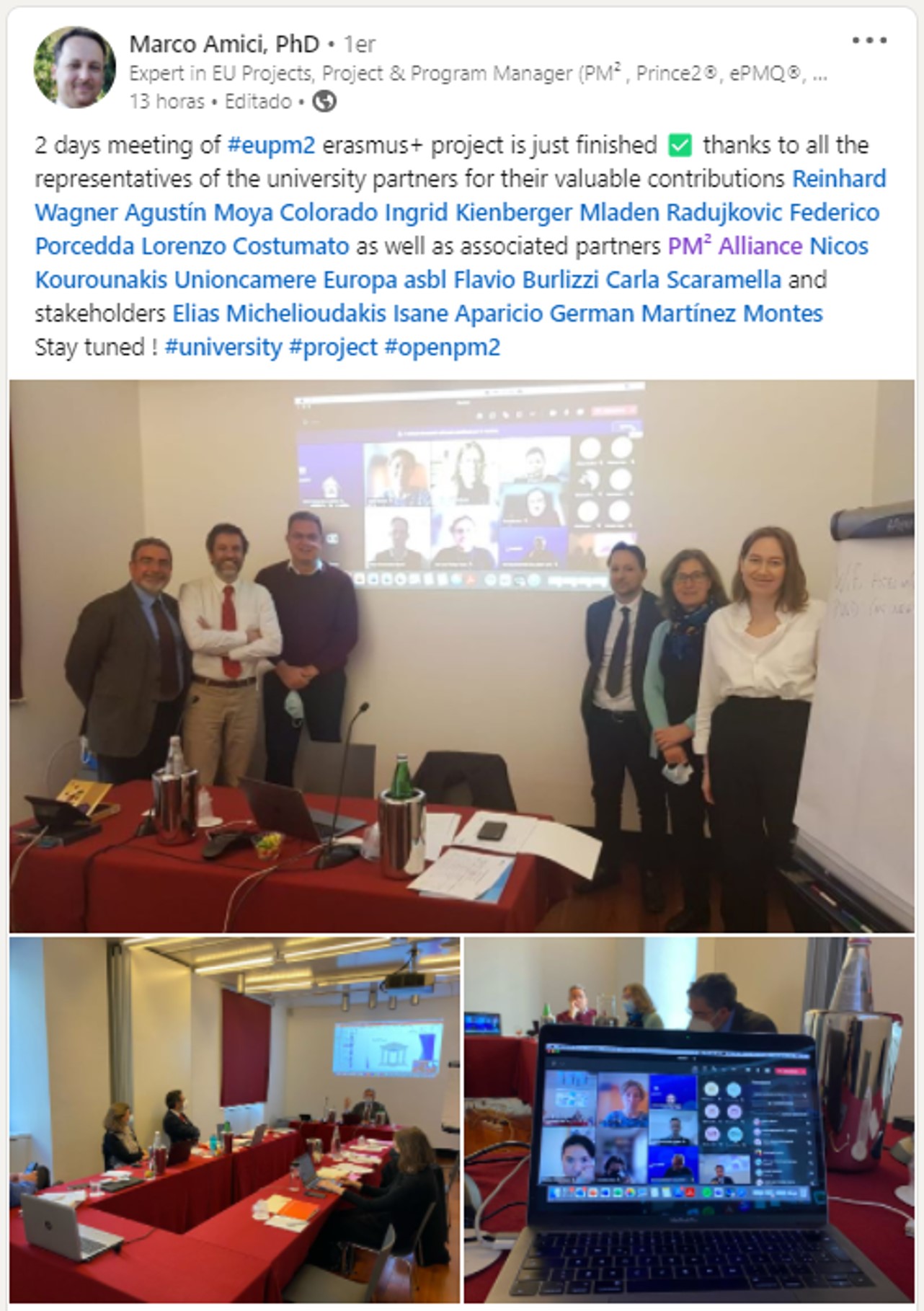
The suggested role of the Chair is to advise and collaborate in defining university curricula to improve project management and leadership skills. To this end, knowledge and mastery of the PM2 project management methodology framework, developed by the European Commission, is considered to be very useful.
Webinar "Research SIG - AEIPRO and Jean Monet Chair PM2EU+"
On Thursday 16 September at 18:00 the AEIPRO's Specific Interest Group on Project Management Research and the Jean Monet Chair were presented.
This event was part of the preparatory work for the Second Centenary Congress organised by LATNET (composed of all the Latin American chapters of the International Project Management Association - IPMA).
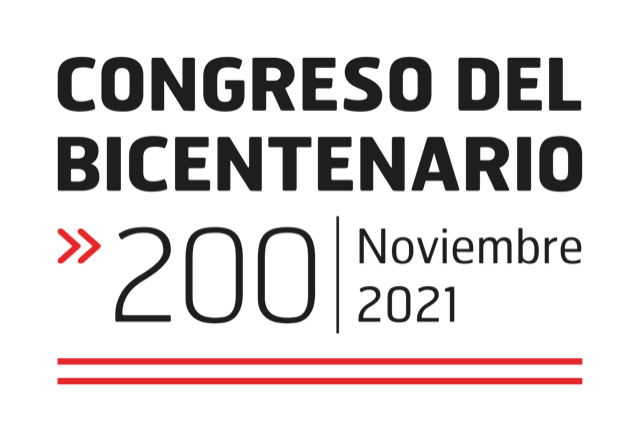
The conference was held by Professor Germán Martínez Montes, holder of the chair. In addition to presenting the main activities carried out to date, an analysis of the main lines of research and development in project management was carried out.
In particular, the Projectification of Society and Economy and the Evaluation of Project Success were analysed in greater depth. Throughout the discussion it was concluded that these lines of work, and the results derived from them, can bring great added value to the improvement of project management. You can download the presentation in the next link: Webinar AEIPRO - Jean Monnet Chair.
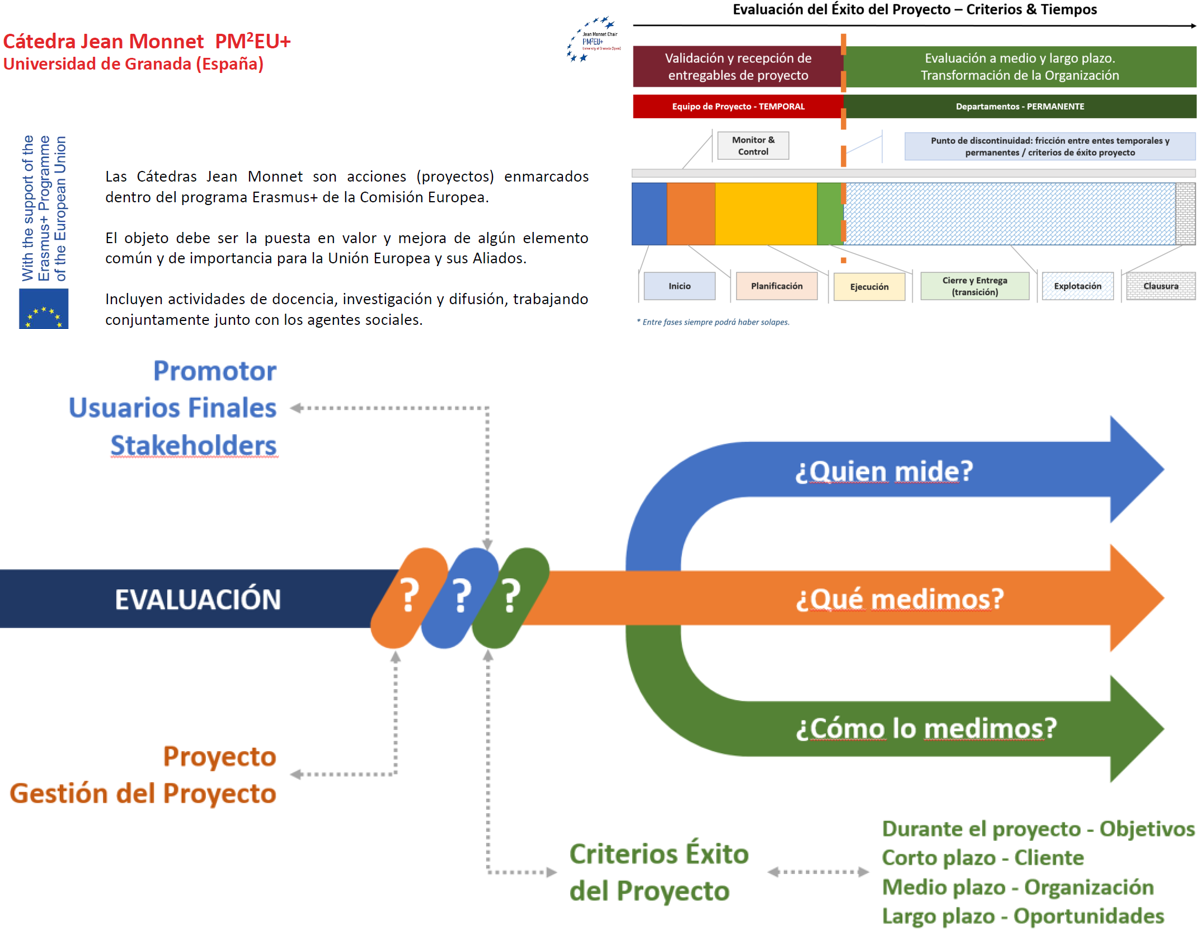
PM2 Talk - PM at Universidades
Universities are a key player in the field of Project Management. On one hand because they offer specialised training in this discipline; on the other hand, they carry out an enormous amount of academic and applied research projects.
In many cases, Project Management tends to be identified with fields related to engineering and technology, but this does not necessarily have to be the case. To talk about Project Management in universities and what PM² can contribute in these areas, we will have the participation of several people from Spanish universities, with extensive experience in the field of Project Management and with knowledge of the PM² Methodology of the European Commission.
The talk was held on the 22nd April at 18:30 with the participation of:
- Germán Martínez, from the Jean Monnet PM² Chair of the University of Granada.
- Elisabet DuoCastella, from the University Pompèu Fabra.
- Bruno Sánchez, from the Isabel I University.
- Javier Pajares, from the University of Valladolid.
- And under the moderation of Agustin Moya, coordinator in Spain of PM2 Alliance.
The link to the event can be found here: PM2 COFFEE TALK
The talk was open, free and ddid not require prior registration.
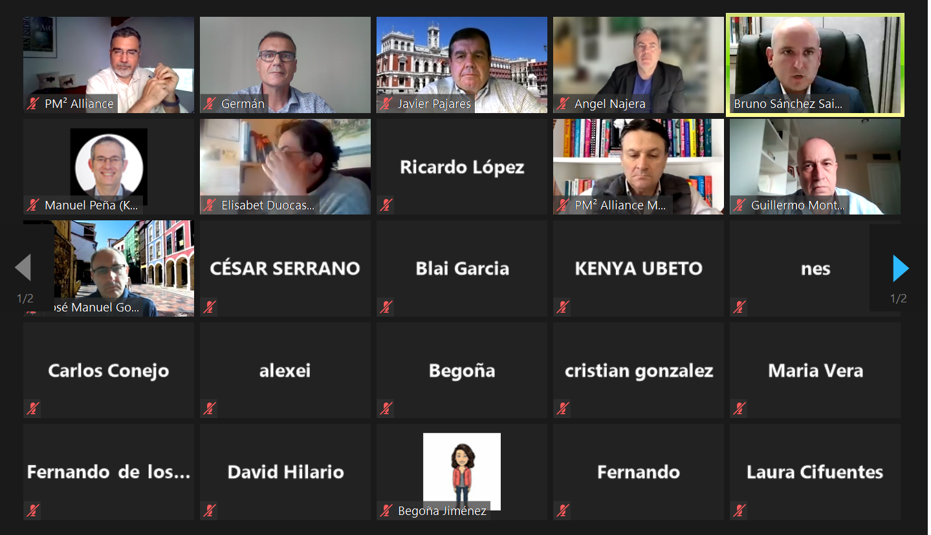
PM² Coffee - Dec 2020
On 10 December 2020 a new PM² Talks was held in collaboration with PM² Alliance Spain to discuss the development of the PM² Alliance 2020 International Conference "Moving Forward: The PM² Advantage".
The call was carried out using the platform provided by Linkedin and was attended by more than 100 professionals related to the world of project management and from a wide range of backgrounds (public sector, training consultants, European Commission officials, etc.)
You can consult the main findings at the following link:
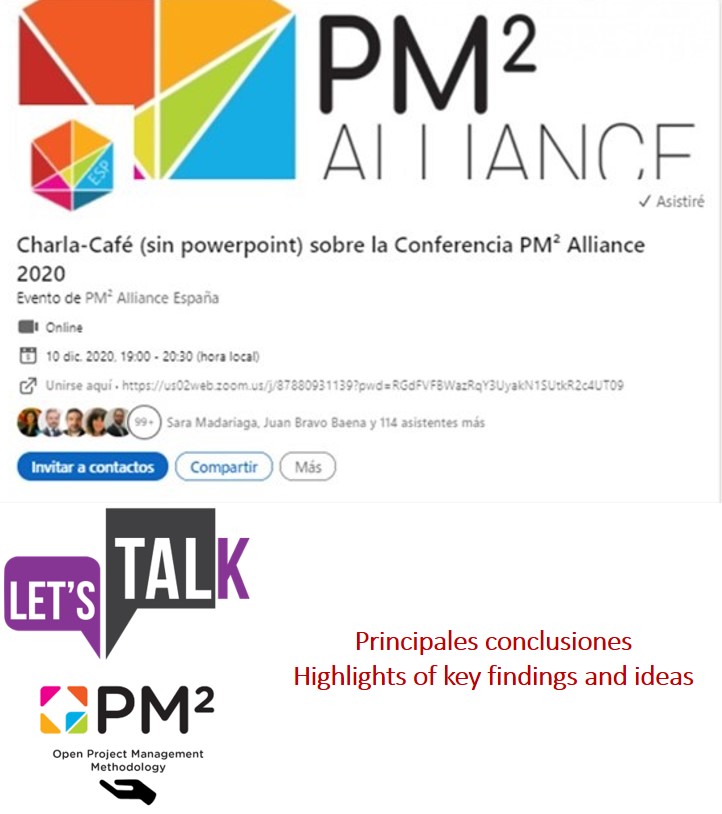
PM² Alliance 2020 International Conference
This year 2020 the PM² Alliance 2020 International Conference "Moving Forward: The PM² Advantage" will be held. Organized by the PM2 Alliance, this year's conference will take place in a virtual format and will involve professionals, trainers and experts in the PM² methodology, who will share their personal experiences in the use of the PM² methodology and the benefits they bring to their organizations.
Presentations and discussions will focus on the use of best practices and project management methodologies that help organizations meet the challenges of project execution, customer engagement and management of contractors and subcontractors.
The Jean Monnet PM2EU+ Chair will have a very active presence and will participate directly in the following session:
- The Open PM² Jean-Monnet Chair Initiative. December 02, 2020. In this session there will be an international presentation of the chair, its main objectives, the actions planned for the next four years and some reflections on the possibilities of OpenPM2.
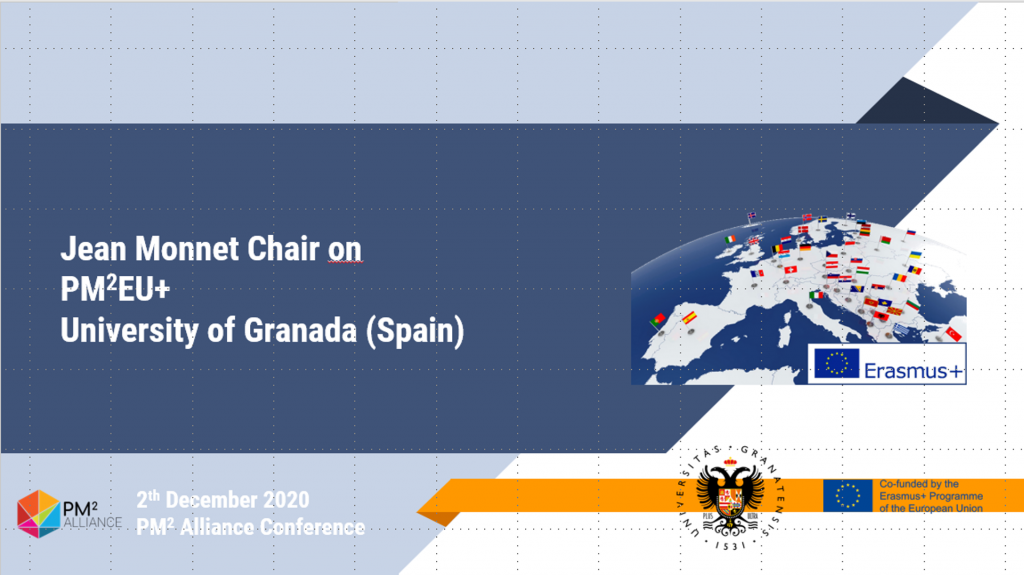
PM² Coffee - Nov 2020
We are going to start with an informative activity - broadcast as an event on LinkedIn - on the 19th at 7pm coffee talk (or tea) with PM² Alliance Spain
- You already know that Open PM² is the European Commission's Project Management Methodology.
- You are aware that it is very interesting, but you don't know exactly what it is or where to look for information.
- You would like someone to tell you more.
- On November 19th at 7pm we will be talking about Open PM² with three people who have been working with Open PM² for some time now.
- We'll tell you where the resources are to start learning the methodology; some things about the Alliance 2020 PM² Conference to get the most out of it; training options in Open PM² and more.
- It's all about starting a conversation with the community interested in PM². It's not a presentation, nor a webinar, just a chat over coffee, or tea or whatever you want, which is what it's all about.
- The talk is open, free and does not require prior registration. If you see that you are interested, put it on your calendar and come by.
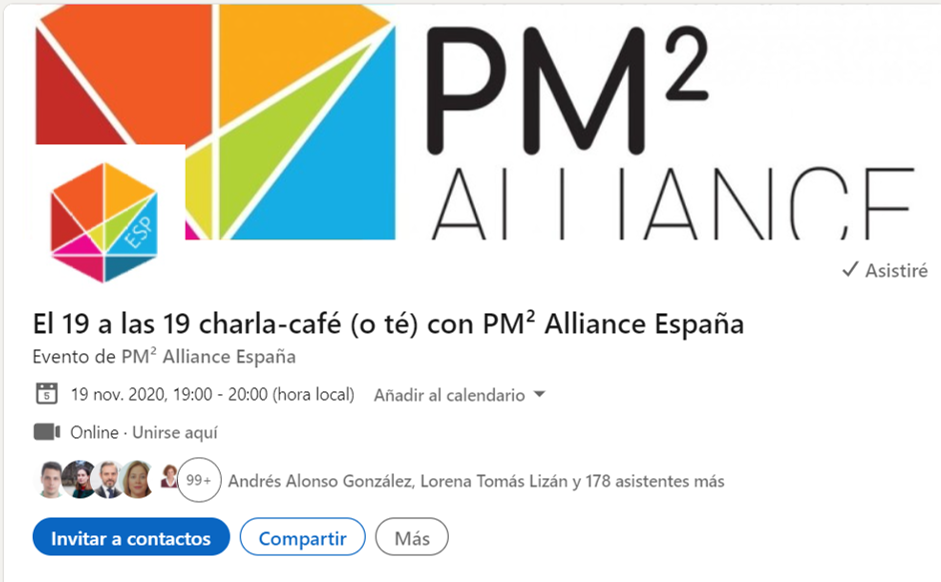
In all these posts and publications, PM2 and OpenPM2 are used indistinctly to refer to the Project Management Methodology developed by the European Commission (free and open since the end of 2016). It could be understood that the name PM2 would correspond to an internal use of the Commission and the name OpenPM2 by the rest of the users.

